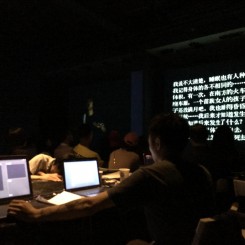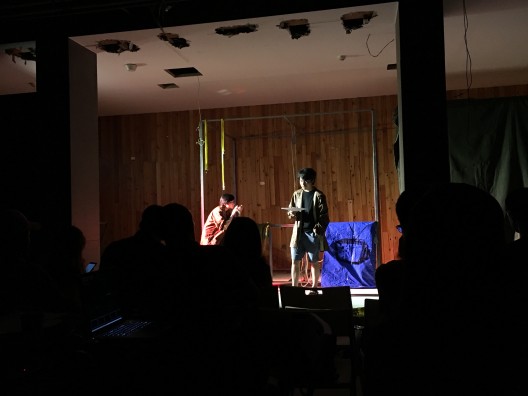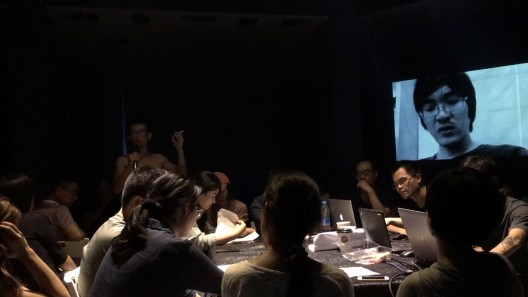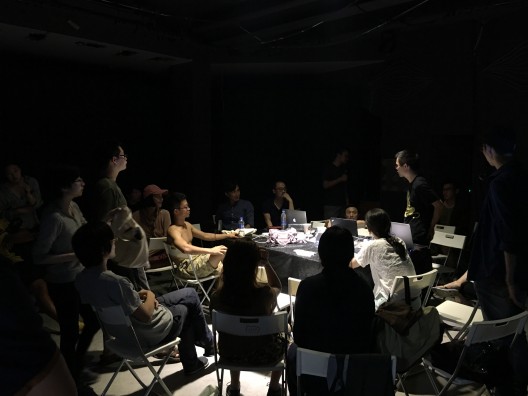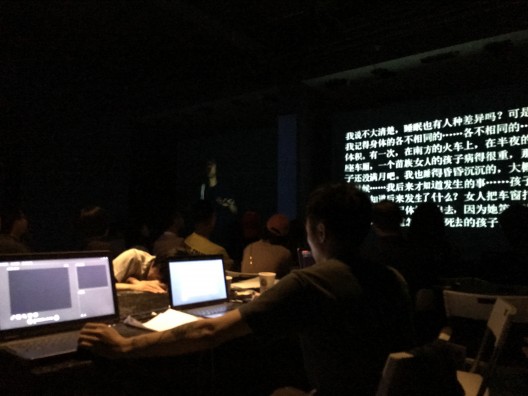This piece is included in Ran Dian’s print magazine, issue 4 (Winter 2016–2017)
1
Far from serving to describe the world, language helps us rather to construct a world. Ethical truths are thus not truths about the world, but truths on the basis of which we dwell therein. These are truths, affirmations, stated or not, that are felt but not proved. (1)
Not until the day I left Shenyang did I start to put together my understanding of On Practice. When I was back in Shanghai, images of Pan He, who couldn’t help shrugging when he got excited during speech, or the unpredictable high pitch of Shenshuai’s Cantonese accent, or Wang Wei pulling hard at his pipe in silence, kept emerging in my brain. During one of the gatherings at Roaming Bookshop in Shenyang, a phrase was brought up and repeated; immediately, this became the missing puzzle piece to a clearer picture of this period of one-and-a-half months: the ethics of practice.
“OnPractice” is a social practice project recruiting artists, writers, curators, and activists from all over the country. The second round of OnPractice intends to ferment a regional youth culture in Northeast China that is alternative to the state narrative (in which the Northeast is in full decline) through an effort to unite cultural workers from different cities. (2) The team paid visits to Harbin, Dalian, and Shenyang to learn about and share notes with local self-organizers. In Shenyang, we worked together with local creatives to put the play “Coldwater Pit: Ghosts in the Pine Grove” on stage. Other than connecting with the locals, a key aspect which developed naturally throughout the process of the project is a kind of living experiment, which I think the project can best self-justify—compared to its larger narratives. In my view, OnPractice is the practice of ethics in the way that any one of the members have the right to stop progress when they feel there is a problem, but no one can force their decision to the whole group without discussing with the rest. This makes the whole process difficult and extremely inefficient. If any practice happened during the project, the maintenance and defense of these ethics is at its core.
The theater performance on July 23 of The Boat in Dalian was the main channel through which the local contemporary art scene—most of OnPractice participants’ usual audience—got to know about the project. It was expected to be a kind of conclusion of the second round of OnPractice, or, to use art jargon, a “presentation”. Its purpose was to gather those who have activist leanings in the fields of literature, art, and social work in the name of a script by Wang Wei adapted from the Lu Rong Yu 2682 Massacre (3), in order to dramatize—to deepen and radicalize—the understanding of each other’s work and of contemporary conditions among participants from different disciplines. Still, for those who were not there that night, the performance is concealed within the skillful rhetoric of the press release and two or three pictures floating around on social media. Whether a “presentation” is necessary or even possible (to whom? how?) has become a constant concern for the OnPractice team. This text is also an attempt to “present”, but there is no way that I can describe my experience in detail by writing. What I can do is to make some abstract reflections with the help of certain theories, hoping to express what I think the meaning and core values of OnPractice are. In Harbin, one of the audience members used the word “democratic” in their response to Jin Te’s introduction of our work in Shenyang, and Jin hastily denied it. I disagreed with him in that I do think the adjective “democratic” is relevant here. I would like to unfold my reflection from the starting point of this common “allergy to democracy”.
2
The captain is larger and stronger than any of the crew, but a bit deaf and short-sighted, and similarly limited in seamanship. The crew are all quarrelling about how to navigate the ship, each thinking he ought to be at the helm; they have never learned the art of navigation and cannot say that anyone ever taught it them, or that they spend any time studying it; indeed they say it can’t be taught and are ready to murder anyone who says it can. They spend all their time milling round the captain and doing all they can to get him to give them the helm. If one faction is more successful than another, their rivals may kill them and throw them overboard, lay out the honest captain with drugs or drink or in some other way, take control of the ship, help themselves to what’s on board, and turn the voyage into the sort of drunken pleasure-cruise you would expect. (4)
The text above is not from The Boat, nor is it some representation of the Lu Rong Yu 2682 Massacre, but excerpted from Book 6 of The Republic—it is an analogy by Plato on democracy. In his view, Plato thinks that not everyone is equipped with the techniques of helming, and the one who is in charge has to have professional knowledge and skills. In a democratic group, the members refuse to give the helm to the one who knows sailing the best; rather, they take it over equally in turn, hence the image of a “drunken pleasure cruise” helmed by a group of irrationals who are driven by emotion and desire. The vessel is in great danger. This analogy is called, in the history of philosophy, the “ship of fools”.
The first critique of democracy in history appears to have been proven recently, in the “unexpected” Brexit referendum and in the farcical US presidential election. The two events seemingly represent the failure of two of democracy’s main tenets: direct and representative democracy. Political commentators in China, official or not, have finally learned the vocabulary to criticize this. We’ve learned the word ochlocracy, or mob politics, to describe the situation where voters fight for a path even though they have no idea where it actually leads; meanwhile, we’ve also learned elitism, or establishment politics, which promotes false egalitarianism from which only a few people really benefit. (5) The mob and the elites have almost become the synonyms for direct and representative democracy. Whether in a democratic country or otherwise, the statement “democracy is dying” is resonating in all corners of the globe.
However, if we pay attention, both the Leave and the Remain campaigns in the UK think that democracy stands on their sides. The reasoning of the Leave supporters is: the British people, instead of some political mogul far away in Brussels, should be the ones who make decisions collectively concerning the fate of the country. (6) On the other hand, the Remain supporters don’t see the EU as the enemy of democracy, but as a bigger defender. They pointed out that issues on which the UK feels it is stumbling on account of being part of the EU such as workers’ rights, trade reciprocity, immigrant policies, are more loyal to the core values of democracy. (7)
Democracy is like an infinite vessel into which everything falls. It is a moral high-ground that one only needs to claim to own without bothering to climb onto. In the political philosophy anthology Democracy in What State? more than one writer refers to democracy as an “empty signifier” that awaits any meaning or usage. (8) From right-wing politicians who are fluent in populism to communist utopianists, from the market’s most loyal adherents to the students protesting on the street, democracy, like a specter, is not absent from any slogans or promises. Naturally, that which is pushed to an altar attracts hatred. In fact, “hatred of democracy is…as old as democracy itself”. (9) Regardless of whether it’s Plato or some Weibo poster, democracy is something one has to both applaud and disclaim.
If we take a closer look, in the US election and in the Brexit voting, “Donald Trump has no ideology to speak of, just as the British Brexiters have no real plan for the future of the Disunited Kingdom.” (10) We propose to ask: what has been mobilized from the voters? Is it a clear collective appeal, or just an extension of anger? The politicians’ strategic instigation allows the voters to quickly find a standpoint in common in terms of emotional catharsis, more so than in the interests of their demands. Does not this tendency towards emotionally driven decision-making sound familiar? The “ships of fools” are sailing at full tilt.
However, what is unexpected by Plato is that apparently it is not the mob who robs the helm, but the personnel of public relations, communications, and marketing. It has been proven that in both the Brexit and the Trump campaigns, fact and opinion, the two key factors in traditional political campaigns, have been devalued to an extent never before seen. The replacements, it turns out, are lies, scandals, and rants. “The election, the most important symbol of democracy, has become a farce of marketing and management…Political affairs are sold like goods rather than public property.” (11) Today, when personal emotions, opinions, and lifestyle all become capital that can be mobilized, and media and internet space the home battlefield for profit and power, we discover: democracy is far away now, but it seems that Plato’s “drunken pleasure-cruise” is still breaking the waves—how can this be explained?
3
After the son is sentenced to death, Liu Guiduo’s parents told the reporter in tears, “How we wish all the people on board could swim like fish.” (12)
When we talk about democracy, are we talking about voting, or the governing system of some countries? Philosopher Jacques Rancière thinks that there are two kinds of democracy: one as a form of government and the other as socio-political life. The former includes voting, congress, elections, and so on. It has its own history, which, like any other history, is written by the ones in power. The official spokesman of democracy is only remotely relevant to democracy. For instance, the 2016 Democratic National Convention consists mostly of chauvinist doctrines, lengthy speech after lengthy speech, and instigative rhetoric. If that which is written and canonized is “true democracy”, then democracy as socio-political life is “real democracy”, as it is phrased in To Our Friends. (13) It exists regardless of time, area, culture, or ideology; one does not need to be a democrat in order to practice real democracy. A party convention is a way of governing which “is always exercised by the minority over the majority”, (14) while gathering on the city square is a kind of political life that everyone can participate in. Although both are regarded as democracy, the former is the embodiment of power, and the latter its restriction.
On Plato’s “ship of fools”, it is a natural order for the one with sufficient knowledge and ability to helm and rule, just as (traditionally) men ruling women, the older ruling the younger. But Rancière thinks that democracy is exactly the subversion of natural order: it is when those who are weaker in strength, knowledge, and age gain power. And as that new power supplements and countervails natural power, real politics takes place. Politics is not the fields we usually think it is: the party, the country, policies, conventions, and so on; rather, it is our encounters with these embodiments of power. Our misunderstanding of politics has caused us to give out too much space during our encounters, but democracy resists those moments of erosion. It emerges when we turn our social media into self-media in public opinion building, when we spontaneously reclaim the planned “public space”, and in every war defending the ever diminishing boundaries of our political life.
Therefore, democracy is intrinsically undisciplined and results in imbalance (balance in the way that there is an indisputable border between the ruler and the ruled) and chaos. It is that “extraordinary exception, the power of the people, which is not the power of the population or of the majority, but the power of anyone at all.” (15) Real democracy confronts power, and a real democratic moment is the moment when one with no seat transgresses and appears at the door of the congress room.
4
There are architects of Apollonian statics and there are (punk) singers of dynamics and transformation. (16)
It’s time to come back to OnPractice. The third act of The Boat is the key part of the entire play. It does not contain any prewritten lines. The performers in the previous acts come back to themselves and hold a meeting together just as in real life. Prepared according to the playwright’s structure, different participants question and criticize each other in order to form “an encounter between the ‘constructor’ and the ‘damager’, and the meeting of the hidden and upcoming anger, fights, and abnormality of our time” (as says the press release). Looking back, I think The Boat as an attempt of “presentation” failed. As sticking to ethics became the priority of the project, rather than completing an artwork, and also because of timing and chance, the collaborative play is, and can only be, a sectional view, or even an exception, of the project. In Act Three, fights and arguments did take place, not among the participants of OnPractice, but between us and the audience.
A meeting containing a pre-designed fight is not unlike a “representative conference”. The meeting in Act Three was not as intense as expected, partly because everyone was drained after weeks of heavy workload, but also because doubts and debates had already happened in everyday life with enough intensity and drama. Unexpected voices came from outside the team. One volunteer and one audience member thought the play was too obscure, so that they did not understand a word. This kind of situation is not unfamiliar for contemporary art people, but somehow the Q&A evolved into a debate between those who are part of OnPractice and those who are not. The former tried to justify the performance and the latter was hardly convinced. A real dialogue never emerged because both sides stayed within their safe zones, holding onto the language and perspective each is conformable with. The fight went nowhere in the end as it ran out of time, and the meeting was sloppily wrapped up. We flunked the anticipated “representative” procedure as it stood against “ethics of practice”. It is like telling a newcomer: you have to familiarize yourself with our rules before expressing any dissatisfaction.
We rush into nonexistent agreement on what we do, sometimes in the name of activism. We’re trapped in procedures, and that makes us anxious. To conquer such anxiety, as suggested by Invisible Committee, is to have the “sensitivity to what is there ”, to re-establish “attention—attention not only to what is being said, but mostly to what is unspoken, attention to the way things are said, and to what can be read on people’s faces and in silences.” (17) Act Three in The Boat is not supposed to be an education about how to read contemporary work—the least it should be about is artists’ self-defense. But it happened, perhaps because we didn’t pay attention to the fact that these two people are the ones who stayed till the third act; we didn’t think that the volunteer’s complaint might actually come from his difficulty in finding common ground with us during the rehearsals; and we failed to notice when these two guys left the space in the end.
I mean to write about the ethics of OnPractice, but it seems I have ended up writing about an exception of the ethics. Nonetheless, this kind of “bias” actually tallies with the paradoxical nature of the “ethics of practice”. This text by no means suggests that this specific social practice project is taking up the responsibility of reinterpreting democracy, but as a writer and organizer who is interested in art’s potential to act up, I take this writing partially as a chance to reexamine my own and my collaborators’ work and views. Is it possible for a self-organized art project—especially one which emphasizes social critique—to follow the same values it claims, in and around its daily life, for its external goal? In other words, when a social intervention is really intervened in by society (here, a society formed by both insiders and outsiders of the project), how would it react? It is true that if we are going to answer every basic question, attend to every participating member, it becomes rather difficult to sharply complete a program, or a simple discussion. However, if we step back a bit, quality, efficiency, presentation, competition—where do these concepts come from? If a project sticks to these words more than it looks after each individual, is it not led towards the exact same path as the spectacle of consumer society, which is the easiest target as censured by contemporary art? It is time to reconsider concepts such as “completeness” and “success” in art criticism.
When our living space is continuously squeezed, the most probable loss is organic connections between individuals. CEOs and politicians know too well how to mobilize and manage our fears and desires, but the kidnapping of human sensibility only breeds domination by power. To reclaim our sensibilities, we have to break hurried agreements and be cautious of mechanical decision-making procedures. We have to attend to each other more than attending to our goal. This is what forms real politics. Notably, what drives us in the first place is often emotion, as well: the fact that we feel angry and feel an impulse that we have to do something now. But how to transform this sense of urgency into “sensitivity to what is there” while staying away from exclusivity and blind efficiency? To find answers is to find common ground: participation, experience, power sharing, collective energy testing. Apparently, affection is central to any self-organization.
In the end, most OnPractice participants think that the object of “practice” turns out to be ourselves. To get to know different individuals and each other’s work, to work together and to live together, this is all exhausting, but overwhelmingly rewarding. In the end, there is joy. A group of people like this resembles an old analogy: the ship of fools. Why do we need a slogan if the destiny of the ship is nowhere but itself? Platonic democracy and Rancièrian views become one: an order-subverting journey impelling the powerless to take the helm. And due to its destructive nature, the journey is a Dionysian one: chaotic, ecstatic, fantastic … Perhaps truth was fore-shadowed the moment Plato penned “drunken pleasure cruise”.
Notes
1 The Invisible Committee, To Our Friends, downloaded at theanarchistlibrary.org (Originally published as À nos amis in 2014 & translated from the French by Robert Hurley), P16.
2 The Northeast of China (Dongbei, sometimes also called Manchuria, consisting of three provinces) is at the stake here because of its rich modern history and contemporary condition. Bearing largely influenced by the Russian Empire and Japanese occupation, the region is one of the earliest areas in China to modernize (e.g. first railway system). After the People’s Republic, it was the first part of the country to develop heavy industry owing to its abundant coal reserves. Once the symbol of planned economy, the Northeast has seen serious economic decline and population loss since the market took over. Young people would rather stay at home or self-employ than working in companies or factories with very low wages.
3 The Shandong fishing vessel Lu Rong Yu 2682 set off in December 2010 with 33 men on board and returned after 8 months with only 11 people. After a two-year investigation, all the 11 men were convicted as responsible for the killings of their 22 missing fellow crew members.
4 Excerpted from Plato, The Republic, Book 6, lines 487d-488e, translated by Desmond Lee [New York: Penguin, 2003 [1955]
5 As a matter of fact, the mobs and the elites are the names these two parties of people give each other.
6 See Theresa Villiers, “‘Democracy was the reason I had to back Leave campaign’”, on https://www.theguardian.com/commentisfree/2016/jun/25/theresa-villiers-democracy-was-the-reason-i-backed-brexit.
7 See Gideon Rachman, “Why true democrats should vote to remain in the EU”, on https://www.ft.com/content/02a40b12-36cd-11e6-9a05-82a9b15a8ee7#axzz4I2xmLdJd.
8 Jean-Luc Nancy and Daniel Bensaid in Democracy in What State? (New York: Columbia UP, 2011, translated by William McCuaig).
9 Jacques Rancière, “Introduction” in Hatred of Democracy (London: Verso, 2007, translated by Steve Corcoran), 2.
10 Quoted from Yuval Noah Harari, “Does Trump’s Rise Mean Liberalism’s End?”, on http://www.newyorker.com/business/currency/does-trumps-rise-mean-liberalisms-end.
11 Wendy Brown, “We Are All Democrats Now”, in Democracy in What State?, page number unknown as I translated this quote from the book’s Chinese translation.
12 “Shandong Fishing Vessel Massacre Survivor: the 11 of Us Killed the Rest 22,” on ifeng.com (inews.ifeng.com/47071878_2/news.shtml) 13 The Invisible Committee, To Our Friends, 20.
14 Rancière, Hatred of Democracy, 52.
15 Rancière, Hatred of Democracy, 49
16 Nadezhda Tolokonnikova, “Nadezhda Tolokonnikova of Pussy Riot’s prison letters to Slavoj Žižek” on https://www.theguardian.com/music/2013/nov/15/pussy-riot-nadezhda-tolokonnikova-slavoj-zizek
17 The Invisible Committee, To Our Friends, 22.
About the writer
Zhang Hanlu is an art critic, cultural studies researcher, and independent curator. Her writing appears also in LEAP, ARTFORUM, and ArtReview Asia. She has worked with institutions, including New York’s No Longer Empty and Shanghai’s Power Station of Art, and independently organizes exhibitions/projects that seek out the intersections between art and society. Her recent interests are the internet and contemporary media conditions.

